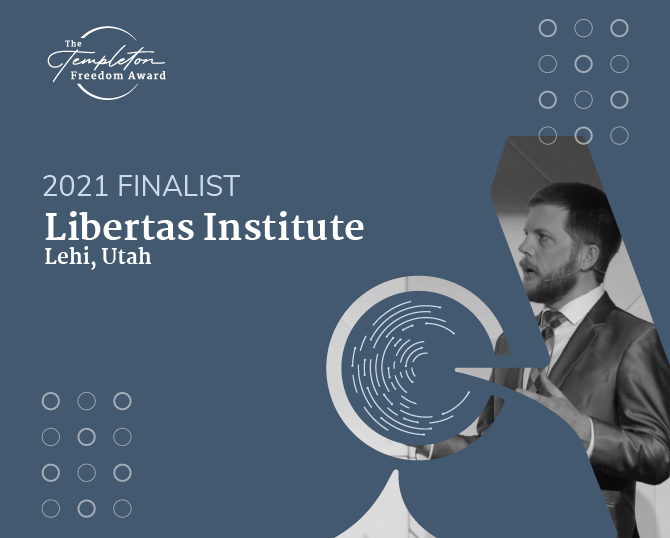Libertas Institute’s regulatory sandbox project named a finalist for 2021 Templeton Freedom Award
- Date:

Red tape and bureaucracy often discourage aspiring entrepreneurs, overwhelm small businesses, and hinder established companies from reaching their full potential. Utah’s Libertas Institute aims to change this stifling environment with the nation’s first comprehensive regulatory sandbox. This innovative system allows business owners to seek exemption from onerous regulations, giving entrepreneurs and enterprises time to innovate while providing lawmakers the opportunity to review and repeal outdated or restrictive policies.
By decreasing unnecessary regulations, Libertas Institute’s regulatory sandboxes create a welcoming environment for fresh business ideas. Sandbox programs in Utah have helped dozens of companies serve their customers more cost effectively and efficiently by reducing their regulatory burden. Libertas Institute is encouraging similar sandboxes across the country and hopes to see their policy proposals adopted on the national level. Libertas Institute’s concerted deregulation efforts are allowing a new generation of entrepreneurs in Utah to achieve their dreams, making the state a beacon of innovation and opportunity in the United States. In recognition of this achievement, Libertas Institute won State Policy Network’s Bob Williams Award for Biggest Win for Freedom.
“The United States has fallen behind in embracing innovation and a free market, so it’s a tremendous honor to have our work promoting opportunity sandboxes be recognized in order to help bring more awareness to how this exciting policy innovation can accelerate entrepreneurship and free up the market across the USA,” said Connor Boyack, president of Libertas Institute, when told that his organization has been named a finalist for this year’s Templeton Freedom Award.
Truly innovative businesses sometimes find themselves in the awkward position of treading beyond the current purview of regulation. While this may seem like an advantage, it can put them in hot water with regulatory agencies. In Utah, for example, a young entrepreneur named Alex started an auto repair cost-pooling business—Otmo.com—as an alternative to traditional car insurance. Similar to faith-based medical cost-sharing organizations, his service quickly brought in many people interested in paying a monthly subscription fee to access car protection designed to help customers rather than insurance companies. After a year of successful operation, Alex was forced to shut down his business by the Utah Department of Insurance—likely due to a complaint from an insurance company threatened by the competition—costing him his dream and hundreds of thousands of dollars.
To stop situations like this from continuing to happen, Atlas Network partner Libertas Institute secured the bipartisan passage of reform establishing a statewide regulatory sandbox in Utah. While other states have passed industry-specific sandboxes of their own, Utah’s is the first to apply to all businesses, regardless of industry or size. This program allows an entrepreneur to apply for a temporary exemption from one or more regulations. As long as the requested exemption does not risk harming the public, the business can operate for up to two years free from enforcement of those regulations.
This system carries a two-fold benefit. First, it allows businesses and entrepreneurs to grow and innovate—creating jobs and thriving communities—without the burdensome, costly, and time-consuming process of jumping through regulatory hoops. This can be crucial for the survival of a small business during the difficult early years of start-up. The sandbox also highlights for lawmakers specific laws and regulations that are shown to inhibit economic growth without having a meaningful societal benefit, providing them an opportunity to reform or repeal outdated or restrictive policy.
Libertas Institute’s successful campaign is a huge step toward enabling and encouraging more of the creative process of permissionless innovation. Their team hopes to see comparable sandboxes adopted in other U.S. states and, eventually, at the federal level. By smoothing the path for those looking to improve their own lives, regulatory sandboxes will help make America the land of opportunity once again.
About Libertas Institute:
The mission of Libertas Institute is to change hearts, minds, and laws to build a freer society by creating and implementing innovative policy reforms and exceptional educational resources.
About Atlas Network:
Atlas Network increases global prosperity by strengthening a network of independent partner organizations that promote individual freedom and are committed to identifying and removing barriers to human flourishing.
About Atlas Network’s Templeton Freedom Award and the additional 2021 finalists:
Awarded since 2004, Atlas Network’s Templeton Freedom Award is named for the late investor and philanthropist Sir John Templeton. The award annually honors his legacy by identifying and recognizing the most exceptional and innovative contributions to the understanding of free enterprise and the public policies that encourage prosperity, innovation, and human fulfillment via free competition. The award is generously supported by Templeton Religion Trust and will be presented during Atlas Network’s Freedom Dinner on December 14 in Miami, Florida, at loanDepot (Miami Marlins) park. The winning organization will receive a $100,000 prize, and five additional finalists will each receive $20,000 prizes. The finalists for Atlas Network’s 2021 Templeton Freedom Award are:
Cato Institute (Washington, D.C.), for their work to eliminate qualified immunity;
Libertas Institute (Lehi, Utah), for their regulatory sandbox project;